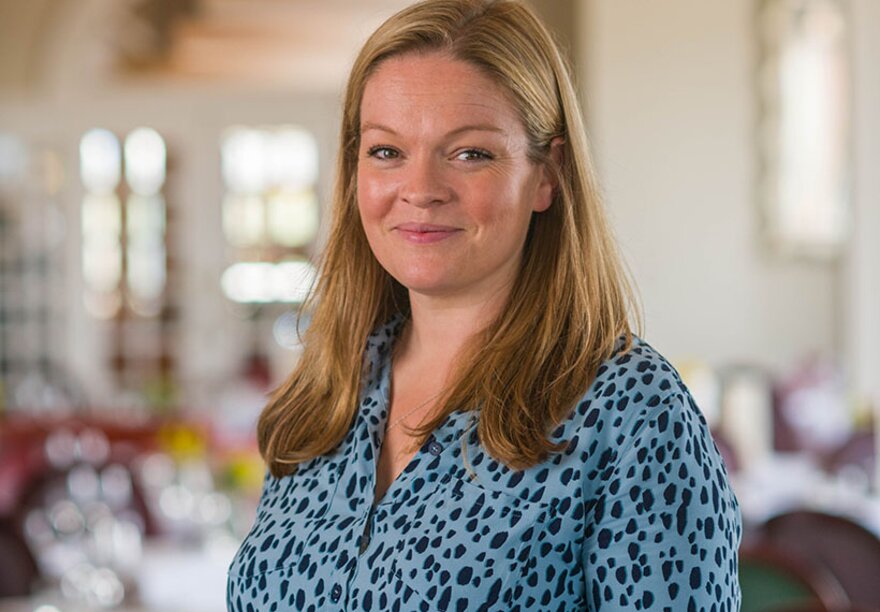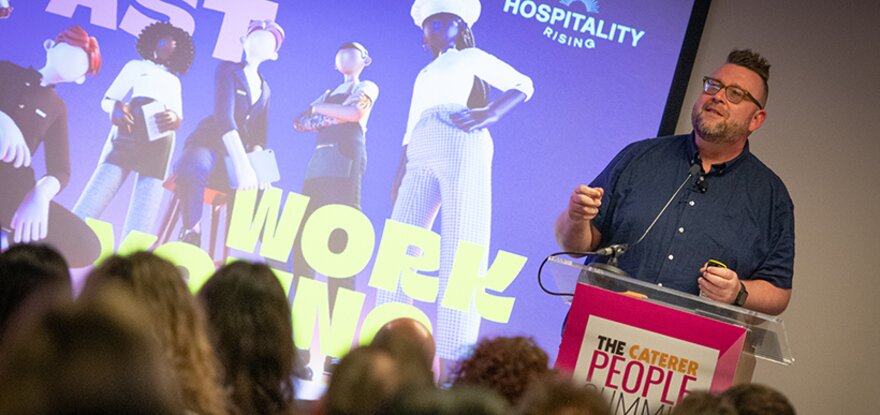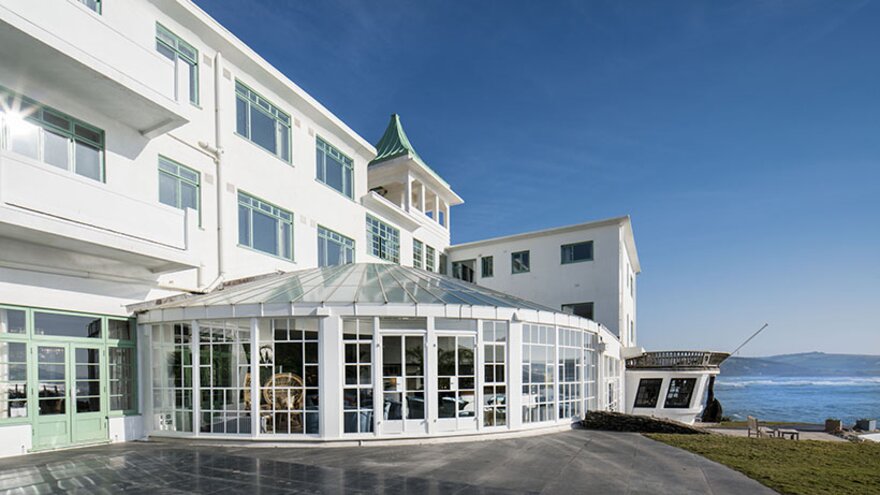The sun is shining and staycations are at an all-time high, so why are hoteliers down when it comes to finding staff? Rosalind Mullen looks for solutions, from cheap accommodation to ultra-flexible jobs
Reports of a welcome rise in staycationers is being tempered by statistics showing further stagnation in recruitment, meaning UK hoteliers are likely to be feeling the heat again this summer.
On the one hand, the latest Go Technology report from hospitality tech provider Zonal and insight firm CGA by NielsenIQ is among many predicting a staycation uptick. It reveals that 81% of respondents plan to stay in a UK hotel in 2023, thanks partly to cost of living pressures, but also because they want to explore the country.
And on the other, an announcement from UKHospitality in April highlighted an Office for National Statistics data warning that there had been no significant improvement in the vacancy rate for the sector, which remained at the 140,000 mark for the fifth month in a row – 48% higher than pre-pandemic levels.
In a statement, UKHospitality chief executive Kate Nicholls said: "Hospitality businesses are now entering the busy summer season, but what should be a time of optimism has become one of despair."
Staffing issues have already forced some hotels in the UK's holiday hotspots to adapt their operating practices. Last July, for instance, the Celtic Collection, which includes the 330-bedroom Celtic Manor in Newport, had 400 vacancies across the portfolio and was forced to close its six-bedroom Newbridge on Usk country inn.
This summer the group is again trying to fill vacancies, particularly for chefs, housekeeping, food and beverage service and seasonal golf green keepers. The Newbridge on Usk has reopened this spring, venues are running at capacity, and robust team welfare alleviates the added burden on teams to cover for any shortages.
"In common with most large hospitality businesses, we still face a recruitment challenge, but the situation has eased," says talent and development director Hannah Elliott. "Across the Celtic Collection we are still recruiting to fill around 100 vacancies, but with a headcount exceeding 1,200 people, this is much more manageable than it was [last year]."
She cites the knock-on effect of Brexit and Covid as being a substantial problem. "There is more choice in the employment market now – including to be remote or home-based. We've introduced flexible and hybrid working models for support staff, but you cannot work from home if you are a chef."
Feedback from the colleges she works with indicates that young adults are less interested in having to travel to work so they can save on transport costs: "Buying a car, for example, is a real cost of living issue and this impacts on applications for jobs where someone has to be physically present at work," says Elliott.
"People are leaving the hospitality industry to work from home in sales, marketing, customer service, admin and IT."
Easy access
Along with other recruiters, Celtic Collection is working on new innovations to push the message that hospitality offers viable and rewarding career paths (see panel). And as vice-chair of the Wales Tourism and Hospitality Skills Partnership, Elliott collaborates with UKHospitality and other industry groups.
"The Migratory Advisory Committee is conducting a review of the Shortage Occupation List in the UK and we will be submitting evidence to highlight the chronic shortage of chefs and other key hospitality roles," says Elliott.
"Locally, we need more affordable housing to address the cost of living issue for people joining at an entry level, and an increase in bus routes can make a big difference in increasing our appeal as a workplace that is easy to get to."
It's a similar story at the 36-bedroom Linthwaite House in Bowness-on-Windermere in the Lake District, which, along with its acclaimed Henrock restaurant, closed two days a week in winter due to lack of staff. It reopened seven days a week in May as it found the two-day closure wasn't a sustainable solution long-term, but recruitment hasn't got much easier, either.
"It has always been difficult to recruit even when it hasn't been a national issue," says general manager Karen Irving. "There is low unemployment – especially in the south lakes – so we are relying on people to come in from other areas or overseas. On that basis, we are 100% affected by Brexit."
She adds: "We have lobbied government to get the same [seasonal visa] rights as the farming industry, but they have declined to date."
Another problem is poor local transport links, which means Irving is unable to tap into unemployment in nearby West Cumbria. Equally pressing is the fact candidates can't find accommodation in the Lakes, thanks partly to AirBnB, the impact of which has reduced the pool of affordable rental properties.
"I am struggling to find staff accommodation. I looked at a three-bedroom apartment, but they were asking a minimum of £1,800 a month," she says. "Business-wise, I am doing OK, but on the front of house side we are still looking for eight positions. This will impact us because every department needs staff."
Inevitably, there is a local wage war. "Some salaries are off the scale and headhunting is the highest I have ever seen it." She adds that there is no animosity, "though I couldn't say poaching doesn't happen".
To solve the problem, the team are being trained in other skills and she is offering job shares, flexible hours and roles for people without experience who can be trained on the job.
The Lake District Hotels Association People Group, of which Irving is chair, has also appointed a recruitment and membership co-ordinator to visit colleges, universities and organise open days.
"As an industry we need to think outside the box about how we can encourage people into the industry. This isn't going to get better – this is long-term," she says.
Perks and payment
At the other end of the country, the family-owned 120-bedroom five-star Headland Hotel in Newquay, Cornwall, is tackling similar problems. "The biggest challenge in Cornwall – and everyone says this – is that there is no affordable accommodation," says director and family member Veryan Palmer. "It is a massive issue. We have now partnered with a local landlord and are offering staff rooms on an aparthotel basis."
Despite that, the hotel, which over the summer needs about 240 staff, has seen steady recruitment.
"We've certainly still got roles to fill, but we're seeing a strong application level," she says. "Part of the reason is we are a good payer in Cornwall and our staff can swim, use the gym, dine for free and bring friends and family, so it's a lovely environment."
Another reason for the buoyant staff numbers is that this will be the third summer the hotel has been running a summer placement scheme for 14- to 16-year-olds.
"The retention rate is 80%," says Palmer. "The first-year cohort, who joined at 14, will work this summer with two summers under their belts. We pay them £9 an hour, which is more than many, and they get barista qualifications, first-aid qualifications and so on, so when they go on to further education they have [an advantage over] their peer group."
One role that is proving challenging to recruit for is housekeeping, which Palmer says is seen as a "Cinderella role" by young people. The visa situation doesn't help either, as previously, Headland attracted overseas candidates coming to learn English and the hotel would put on language classes. Throughout the year, full-time staff numbers hover at 130 and flexible hours are offered across a diverse demographic.
"One lady who is aged 86 does two hours a week," says Palmer. "We have people who worked at a senior level, retired here and are bored and now do a few days a week, which is helpful because they can train young people."
The hotel has also had success by embracing people with additional needs. One employee is 70% blind and works as a member of the grounds team, for instance.
"Hospitality has an opportunity to be stupendously inclusive," says Palmer.
"We would love more housekeeping staff, but we are a big team here and I've been known to strip beds myself and the whole team will muck in. But at the end of a hard day you sit and have an ice-cream and watch the waves."
Celtic Collection takes the initiative to recruit
Over the past two years, Celtic Collection has introduced a number of initiatives to improve recruitment, including:
- Employed its first in-house recruiter
- Engaged a social media agency to create Celtic Collection jobs accounts on Facebook, Instagram and TikTok
- Reached out to company alumni to return
- Recruited 10-15 trainee chefs for a 12-month placement each year from University College Birmingham
- Recruited Ukrainian refugees
- Signed the Armed Forces covenant
- Gave welcome boxes and cards to new starters and welcome bonuses for key appointments
- Sponsor relocation
- Open-day bus pick-ups
- Opened its own city centre job shop for four months at the height of the challenge in 2022
- Huge focus on apprenticeships with new starters now ‘auto-enrolled' onto an apprenticeship.
- On-site office space for external apprenticeship provider
The growth of Hospitality Rising
When Mark McCulloch saw a tweet in May 2021 alerting the industry to an imminent staff shortage across all roles, his 20 years of marketing experience kicked in. Identifying that one of the biggest issues facing recruiters was the brand image of the industry, he founded Hospitality Rising.
Six months since he launched its Rise Fast, Work Young marketing campaign, the results are impressive. Research carried out a year ago by Hospitality Rising, in partnership with research consultancy KAM, showed that only one in five adults under 30 considered hospitality to be an appealing industry to work in. Thanks to the campaign, that has now risen to one in three saying they would consider a career in hospitality. Its success is underlined by the fact that 46% of the targeted 18- to 30-year-olds had seen and remembered the campaign.
The campaign has attracted over 120,000 job applications to date. McCulloch says: "The aim was to just go after the biggest flippable part of the population who were already in different industries – and they were people under 30. What we needed was a campaign to change the perception forever of what a job or career in hospitality can be like."
To reach the under-30s demographic, most of the campaign – which picked up on insights such as "hospitality is never boring" and "it's flexible and sociable" – is on digital platforms such as TikTok and YouTube ads. A Vietnamese model-maker contributed illustrations of six characters to represent all areas of hospitality, and a Grime singer put a soundtrack to it.
"What is important is that you can work in hospitality for just a season, you do not always need to force everyone into a career," McCulloch adds.
The £2m campaign was financed by £900,000 from within the industry and £1m of free work from the creatives. The jobs board is an add-on to the campaign where investors can upload their vacancies for £10 per employee.
Next year, McCulloch will look at new ways candidates can submit job applications. "We've found that the youth don't want to apply in the way we make them apply, so we want to change to multiple ways to apply," he says. "We are trying to attract an audience of people who have never considered hospitality before. We are gearing up for a second year of fundraising now," he says.
To get involved, go to www.hospitalityrising.org
Burgh Island on building its own staff accommodation
Giles Fuchs, owner of the luxurious 25-bedroom Burgh Island hotel in Devon, believes one reason why hotels are struggling to find staff this summer is that there are fewer people in the general employment market: "It's no different in hospitality. Younger people in particular are happier to get by and are less interested in making money and committing to a career just yet. Hotels need to encourage staff to join by highlighting the unique life experiences from working in the sector."
The happy challenge for hoteliers, of course, is that business is recovering and staycationers have remained loyal since Covid. "We are currently at 92% occupancy for the summer so from what we can see, the hospitality business is back in full swing," says Fuchs. His hotel does, however, have a particularly tough challenge in accommodating seasonal – and permanent – staff because it is cut off from the rest of Devon at high tide.
The art deco property, which has three restaurants, employs 100 staff during high season, but until recently there was limited staff accommodation, compounded by a shortage of affordable housing on the mainland thanks to average local property prices exceeding £418,000.
Fuchs has eased the situation by buying a former care home and has invested £500,000 to create 22 ensuite double bedrooms, gardens, and a gym to house staff.
"It's been a massive improvement," he says. "Though some of our staff accommodation is on the mainland, there is also some on the island, which we have used to look after our staff to the highest quality."
Fuchs, who recently put the private island and hotel up for sale for £15m to pursue his other business interests, has recruited most of the staff needed for the summer, though he acknowledges the recruitment climate this year is challenging and adds: "We're always looking for new talent".
Continue reading
You need to be a premium member to view this. Subscribe from just 99p per week.
Already subscribed? Log In












